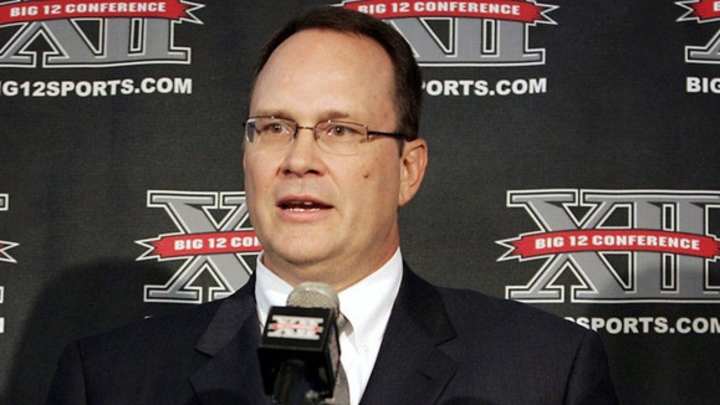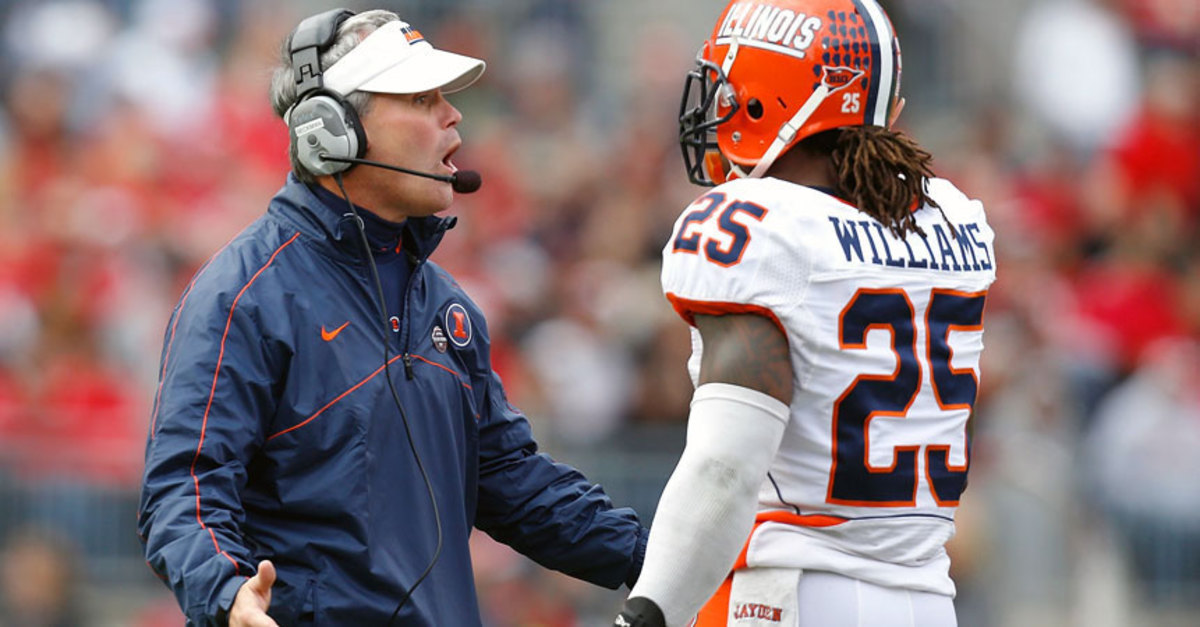Dan Beebe's new role? Creating better environments for players and coaches

Illinois athletic director Mike Thomas dropped a familiar name Friday as he explained why he fired football coach Tim Beckman and the steps the athletic department would take going forward. Some of those steps, Thomas said, would be assisted by Dan Beebe.
Yes, that Dan Beebe.
Shortly after his ouster as Big 12 commissioner following the conference's near-disintegration—for reasons mostly outside his control—Beebe joined partners Mike McCall and Mark Thompson to create the Dan Beebe Group. The consulting firm specializes in risk management and works with organizations and schools to help establish reporting guidelines for employees and for athletes. The group has worked with the athletic departments at Florida and Auburn and with the NFL's Houston Texans. And maybe, had Illinois hired the group earlier, Beckman might still have a job. Or maybe he would have been fired much sooner.
A few months ago, a football coach—not at Illinois—got frustrated during a training session with Beebe's group. "Just tell me what the [expletive] I'm allowed to say," Beebe remembers the coach saying. That isn't exactly Beebe's role. He doesn't want to lay down a blanket set of guidelines for coaches and administrators. Yes, players are now more likely to publicly complain about their coaches than they were in the past, but Beebe's goal isn't to stamp out hard coaching or coaches who utter the occasional profanity. It's to create an atmosphere in which players and subordinates can air their grievances without fear of reprisal, and in which school administrators can feel comfortable knowing they have a system in place so they can accurately determine whether coaches have crossed a line into verbal or physical abuse.
One of the problems at Illinois was the people with power over Beckman hadn't heard many of the complaints about the coach until former Illini offensive lineman Simon Cvijanovic went public on Twitter in May with accusations of abuse against Beckman. Had the Illini had a channel for reporting complaints—independent of Beckman and his staff—those kinds of complaints might have gotten to Thomas sooner. They could have been investigated, and, if they didn't reach the level of a fireable offense, they could have been corrected. Or, if they did reach that level, Beckman could have been jettisoned earlier instead of a week before the season.
Beebe and his group work to help organizations establish these channels, and sometimes this process isn't easy for coaches and athletic directors. "What's hard in the athletics world is coaches and administrators want to control everything," Beebe says. "But there has to be some release when it comes to human relations." The reporting channels for players' issues with their coaches aren't that different from the channels a company would create for its employees to report issues with their bosses. The power dynamic must be changed, Beebe says, or a player won't trust that the person they're talking to isn't simply the coach's lackey.

Kirk Irwin/Getty Images
That's why athletic departments need to assign people whose employment isn't governed by the coach to handle such issues. That person could report directly to the AD or even to the provost or university president. Once departments have established a reporting structure, they need to make their athletes aware of their options when they have an issue. Beebe's group meets with each team at a school to ensure all of the players know where they have to go. Beebe and his partners also leave their contact information so players can contact them directly if they have an issue and don't trust anyone at their school. This way, when an issue does arise, school administrators can show inquiring reporters and saber-rattling attorneys that they had a system in place and what steps were taken to address the problem.
A coach may see this sort of thing as just another intrusion on the way he does his job. It's no secret that the world has changed recently for players and coaches. That dynamic has changed with every generation. When older coaches were players, they were denied water at practice. When younger coaches were players, they had far more full-contact practices and participated in drills, such as "Bull in the Ring," that are now banned. These methods may have made some coaches into the men they are, but most players, parents or peers don't accept them today.
The truth is most coaches can adjust. And even those who have more trouble adjusting probably don't want to be abusive. No matter what, they certainly don't want to lose their jobs. So, a defined reporting structure might not be such a bad thing for the coaches, either. Here's an example. Maybe there is an assistant who tries to motivate his players through foul, profanity-laced personal insults. He talks about their mamas. He talks about their girlfriends. Maybe a player complains through the channels established by his athletic department. Maybe that coach is brought into a meeting with his head coach and athletic director and told to correct the behavior. Maybe he is told to get mad and cuss about the blocking drill he is angry about instead of personally attacking the players. Maybe he corrects the behavior and has no further issues. That's certainly a better alternative than continuing the behavior for months or years until a player posts an Instagram video of a tirade during a position meeting. At that point, so many complaints may come out of the woodwork that the head coach has no choice but to fire that assistant.
Beebe offers a ripped-from-the-headlines example. "There may be someone who raises a question about the way you coach," Beebe says. "But why not deal with it now in a meeting with administrators instead of going through what the Miami Dolphins went through?"
Beebe's goal is to put a system in place that can catch these issues early—before a player quits a team over perceived abuse or a coach crosses the line by so much that he has to be fired. That won't solve every delicate interpersonal issue in a football program or an athletic department, but it likely would have saved Illinois a lot of negative press and a mess on the eve of the football season.
